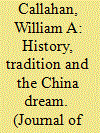| Srl | Item |
| 1 |
ID:
164060


|
|
|
|
|
| Summary/Abstract |
The One Belt, One Road initiative has become a very important contribution of the fifth generation of PRC leaders to the development of China's foreign policy, which has determined the vector of the country's relations with its neighbor countries for the foreseeable future. The Chinese authorities regard this initiative as a principally new phenomenon in world politics, pointing to its direct connection with the historical practice of cooperation in the vast area of the Silk Road and a traditional Chinese approach to relations with its neighbors.
|
|
|
|
|
|
|
|
|
|
|
|
|
|
|
|
| 2 |
ID:
141450


|
|
|
|
|
| Summary/Abstract |
How will China influence world politics in the twenty-first century? Many people answer this question by looking to Chinese history, and particularly to traditional models of Chinese world order. This essay seeks to complicate this question by asking which history, and which tradition? While it is common to look at China's pre-modern history as ‘tradition’, this essay argues that we also need to appreciate how ‘socialism’ is treated as a tradition alongside Chinese civilization. It does this by examining how China's public intellectuals appeal to two seemingly odd sources: Mao Zedong's 1956 speech ‘Strengthen Party Unity and Carry Forward Party Traditions’, and the ‘Great Harmony’ passage from the two millennia-old Book of Rites. It will argue that these two passages are employed as a way of salvaging socialism; the ideological transition thus is not from communism to nationalism, but to a curious combination of socialism and Chinese civilization. This new socialist/civilization dynamic integrates equality and hierarchy into a new form of statism, which is involved in a global competition of social models. Or to put it another way, what these two passages have in common is not necessarily a positive ideal, but a common enemy: liberalism, the West and the United States.
|
|
|
|
|
|
|
|
|
|
|
|
|
|
|
|
| 3 |
ID:
170137


|
|
|
| 4 |
ID:
141449


|
|
|
|
|
| Summary/Abstract |
Looking to China's imperial history to understand how China as a great power will behave in the twenty-first century, some scholars have rediscovered the concept of the traditional Chinese world order coined by John K. Fairbank in the 1960s in the reconstruction of the benevolent governance and benign hierarchy of the Chinese Empire, and portrayed its collapse as a result of the clash of civilizations between the benevolent Chinese world order and the brutal European nation-state system. China was forced into the jungle of the social Darwinist world to struggle for its survival. As a result, China's search for power and wealth is to restore justice in an unjust world. China's rise would be peaceful. This article finds that while imperial China was not uniquely benevolent nor uniquely violent, the reconstruction of China's imperial past to advance the contemporary agenda of its peaceful rise has, ironically, set a nineteenth century agenda for China in the twenty-first century to restore the regional hierarchy and maximize China's security by expanding influence and control over its neighborhoods.
|
|
|
|
|
|
|
|
|
|
|
|
|
|
|
|